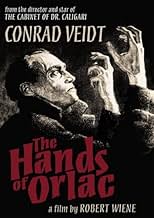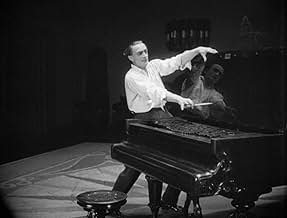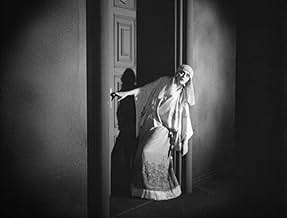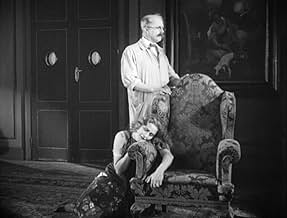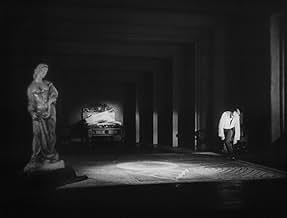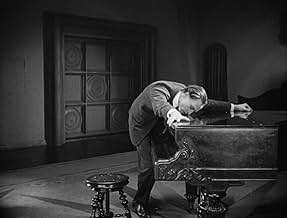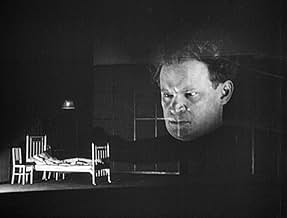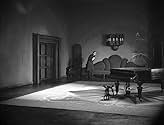IMDb-BEWERTUNG
7,0/10
3682
IHRE BEWERTUNG
Ein weltberühmter Pianist verliert bei einem Unfall beide Hände. Wenn neue Hände verpflanzt werden, weiß er nicht, dass sie einmal einem Mörder gehörten.Ein weltberühmter Pianist verliert bei einem Unfall beide Hände. Wenn neue Hände verpflanzt werden, weiß er nicht, dass sie einmal einem Mörder gehörten.Ein weltberühmter Pianist verliert bei einem Unfall beide Hände. Wenn neue Hände verpflanzt werden, weiß er nicht, dass sie einmal einem Mörder gehörten.
- Regie
- Drehbuch
- Hauptbesetzung
Conrad Veidt
- Paul Orlac
- (as Veidt)
Alexandra Sorina
- Yvonne Orlac
- (as Sorina)
Fritz Strassny
- Der alte Orlac
- (as Strassny)
Paul Askonas
- Der Diener
- (as Askonas)
Carmen Cartellieri
- Regine
- (as Cartellieri)
Hans Homma
- Dr. Serral
- (as Homma)
Fritz Kortner
- Nera
- (as Kortner)
Empfohlene Bewertungen
One of the real classics of Expressionism -- even the Americans think so, to judge from the fact that they've remade it (badly) several times. To be sure, the premise won't stand examination (but then, it's horror), and a modern viewer may find it hard to adjust to the actors' Expressionist grimacing. However, the movie is consistently suspenseful due to its heavy dark atmosphere and communication of mental torment. The fear of one's own body is a dynamite theme if it's as well presented as it is here.
A famous pianist (Conrad Veidt) has his hands crushed in a train accident, and he receives new ones through an experimental transplant. But whose hands were they before? The hands of a killer!
This is a rather long film, probably more than it needs to be. The train wreck shots are beautiful, but go on a while, with the story being relatively simple.
The focus here is more on Orlac's mental state, and less on the others in any way, with the love affair angle of "Mad Love" (its remake) completely absent. For fans of "Mad Love", this picture needs to be respected, as they clearly borrowed scenes (noticeably where Orlac meets his donor), but "Mad Love" is the superior film in many ways.
This is a rather long film, probably more than it needs to be. The train wreck shots are beautiful, but go on a while, with the story being relatively simple.
The focus here is more on Orlac's mental state, and less on the others in any way, with the love affair angle of "Mad Love" (its remake) completely absent. For fans of "Mad Love", this picture needs to be respected, as they clearly borrowed scenes (noticeably where Orlac meets his donor), but "Mad Love" is the superior film in many ways.
Flirting with a (then) science fictional theme of body part transplantation, the film explores the feelings of a concert pianist, who having lost his hands in a train wreck, receives a new pair of hands that belonged to an executed murderer. Austrian director Robert Weine, who created the landmark 'The Cabinet of Dr. Caligari' (1919) here reunites with and directs its star, Conrad Veidt, as the tormented pianist Paul Orlac.
The camera focuses on Veidt's many moods and reactions to his plight -- his hands are not capable of his concert abilities, and he feels that they are taking him over with thoughts and deeds of crime and murder. He does an outstanding job, but too much of the film is slowly paced. From the beginning extended train crash rescue, on through scene after scene of Orlac's, his wife's and the maid's over the top Expressionistic gesturing, the scenes seem to go on too long.
This slow pace is exaggerated by the lack of camera movement (everything is mostly wide shots with little tracking), the wonderfully and effectively spooky new musical score (on the KINO 2008 version), that sometimes lacks verve and variety, as well as the extensive time spent on the actors' Expressionist movements.
The film certainly has its high points. It's great to see an entire film shot in shadows and low light, all with Gothic sets. This is great German Expressionism. If you can relax and just go with the pace of the film, you can really enjoy the acting of Conrad Veidt-- whose hands keep getting creepier and scarier.
If it were cut to about sixty minutes to pick up the pace, it would be easier to enjoy and to see the great care that went into its creation and execution.
I'll have to give it a six.
The camera focuses on Veidt's many moods and reactions to his plight -- his hands are not capable of his concert abilities, and he feels that they are taking him over with thoughts and deeds of crime and murder. He does an outstanding job, but too much of the film is slowly paced. From the beginning extended train crash rescue, on through scene after scene of Orlac's, his wife's and the maid's over the top Expressionistic gesturing, the scenes seem to go on too long.
This slow pace is exaggerated by the lack of camera movement (everything is mostly wide shots with little tracking), the wonderfully and effectively spooky new musical score (on the KINO 2008 version), that sometimes lacks verve and variety, as well as the extensive time spent on the actors' Expressionist movements.
The film certainly has its high points. It's great to see an entire film shot in shadows and low light, all with Gothic sets. This is great German Expressionism. If you can relax and just go with the pace of the film, you can really enjoy the acting of Conrad Veidt-- whose hands keep getting creepier and scarier.
If it were cut to about sixty minutes to pick up the pace, it would be easier to enjoy and to see the great care that went into its creation and execution.
I'll have to give it a six.
The pianist Paul Orlac (Conrad Veidt) is on tour and his wife Yvonne Orlac (Alexandra Sorina) anxiously waits for his return. While traveling back home, there is a train wreck at Montgeron and Orlac is very injured in both hands in the accident.
Yvonne begs to Dr. Serral (Hans Homma) to save his hands that are his life. Meanwhile, the robber and murderer Vasseur that claims that is innocent is sentenced to death since the police investigator had found his fingerprints everywhere near the victim. Dr. Serral transplants Vasseur's hands in Orlac and when he recovers, he feels that there is something wrong with his hands.
Orlac asks the surgeon about the hands and learns that he belonged to a criminal, and Orlac decides to never touch Yvonne again with those hands. His family becomes poor since he is not working anymore and Yvonne pays a visit to her father-in-law (Fritz Strassny) to ask for help. However, Orlac's father is a cruel man and does not help her. When Orlac returns home, Yvonne asks him to visit his father and when he arrives at his house, he finds his father dead. They call the police and they find Vasseur's fingerprint everywhere. Orlac is the only heir of his father fortune but sooner he is followed by a stranger named Nera (Fritz Kortner) that blackmails him and demands a small fortune. Orlac is not sure that he had killed his father and goes with Yvonne to the police. Sooner they discover a secret about Vasseur.
"Orlacs Hände" is a Gothic and dark German Expressionist film with an unbelievable plot (but who matters?) but wonderful theatrical performances like in most silent classics and perfect use of shadows in a gloomy atmosphere. The music score fits perfectly to the film and this is the first time that I watch this little masterpiece. My vote is eight.
Title (Brazil): "As Mãos de Orlac" ("The Hands of Orlac")
Yvonne begs to Dr. Serral (Hans Homma) to save his hands that are his life. Meanwhile, the robber and murderer Vasseur that claims that is innocent is sentenced to death since the police investigator had found his fingerprints everywhere near the victim. Dr. Serral transplants Vasseur's hands in Orlac and when he recovers, he feels that there is something wrong with his hands.
Orlac asks the surgeon about the hands and learns that he belonged to a criminal, and Orlac decides to never touch Yvonne again with those hands. His family becomes poor since he is not working anymore and Yvonne pays a visit to her father-in-law (Fritz Strassny) to ask for help. However, Orlac's father is a cruel man and does not help her. When Orlac returns home, Yvonne asks him to visit his father and when he arrives at his house, he finds his father dead. They call the police and they find Vasseur's fingerprint everywhere. Orlac is the only heir of his father fortune but sooner he is followed by a stranger named Nera (Fritz Kortner) that blackmails him and demands a small fortune. Orlac is not sure that he had killed his father and goes with Yvonne to the police. Sooner they discover a secret about Vasseur.
"Orlacs Hände" is a Gothic and dark German Expressionist film with an unbelievable plot (but who matters?) but wonderful theatrical performances like in most silent classics and perfect use of shadows in a gloomy atmosphere. The music score fits perfectly to the film and this is the first time that I watch this little masterpiece. My vote is eight.
Title (Brazil): "As Mãos de Orlac" ("The Hands of Orlac")
Ah, what aristocratic days are these!!... These modern times of the new 21st century have many similarities to the old youthful times that Herr Graf spent in Deutschland at the beginning of the ancient 20th century; that is to say, during those days the world had a tremendous financial crisis not to mention the menace of a world flu pandemic. It seemed appropriate then that Herr Von decided to revisit those memories by watching at the Schloss theatre a strange, oppressive film, a picture that reflected those times and the aristocratic mood. A perfect soirée, indeed!... The film was "Orlacs Hände" (1924) by Herr Robert Wiene.
It was a pleasure ( you have to know that German aristocrats have fun in a different and dark way .. ) to watch again such a classic Expressionist masterpiece. Thanks are owed to the longhaired youngsters at Kino who did an excellent restoration of this old nitrate which includes a bearable music score by Herr Paul Mercer that helps one to suppress the memory of the terrible score that was included some time ago in another release of the film; that music was scarier than the film itself.
Even today, to watch "Orlacs Hände" is a disturbing experience aside from appreciating its Expressionist values. Early in the film, the train crash sequence is full of dark and impressive shots that capture the confusion, warning the audience that this is a special oeuvre. It bespeaks a terrible chaos, uncertainty and darkness that engulfs the viewer in an oppressive, tormented atmosphere.
Due to the train crash, Herr Orlac ( Herr Conrad Veidt ) our hero will suffer horrible wounds to body and soul. The physical scars heal up but the psychological wounds are more difficult to overcome, especially when Herr Orlac discovers that his new hands belonged to an assassin. This marks the beginning of a terrible "tour de force" between body and soul that will torment Herr Orlac throughout the film. His fragility is challenged by pain and suffering and though solace and calm ultimately prevail he must first face constant uncertainty, delirium and the threat of insanity.
The Expressionist shadows, appropriately enough, surround the main characters ( The performances by the great Herr Veidt and Dame Alexandra Sorina are also in the Expressionist manner ) and their habitats; their home, at the hospital, and in the streets. An oppressive, morbid, gloomy atmosphere prevails and suits perfectly a story of wicked impulses and disturbed minds.
Hands demanding crimes, the weakness of the human will, blackmail from an unscrupulous criminal, a medical experiment, a father who hates his son such are the subjects in "Orlacs Hände", an unnerving masterpiece and the perfect aristocratic silent film choice for a cloudy soirée in these 21st uncertain times.
And now, if you'll allow me, I must temporarily take my leave because this German Count must lend a hand in this time of crisis by drinking only a glass of Rhine white wine instead of the whole bottle.
Herr Graf Ferdinand Von Galitzien http://ferdinandvongalitzien.blogspot.com/
It was a pleasure ( you have to know that German aristocrats have fun in a different and dark way .. ) to watch again such a classic Expressionist masterpiece. Thanks are owed to the longhaired youngsters at Kino who did an excellent restoration of this old nitrate which includes a bearable music score by Herr Paul Mercer that helps one to suppress the memory of the terrible score that was included some time ago in another release of the film; that music was scarier than the film itself.
Even today, to watch "Orlacs Hände" is a disturbing experience aside from appreciating its Expressionist values. Early in the film, the train crash sequence is full of dark and impressive shots that capture the confusion, warning the audience that this is a special oeuvre. It bespeaks a terrible chaos, uncertainty and darkness that engulfs the viewer in an oppressive, tormented atmosphere.
Due to the train crash, Herr Orlac ( Herr Conrad Veidt ) our hero will suffer horrible wounds to body and soul. The physical scars heal up but the psychological wounds are more difficult to overcome, especially when Herr Orlac discovers that his new hands belonged to an assassin. This marks the beginning of a terrible "tour de force" between body and soul that will torment Herr Orlac throughout the film. His fragility is challenged by pain and suffering and though solace and calm ultimately prevail he must first face constant uncertainty, delirium and the threat of insanity.
The Expressionist shadows, appropriately enough, surround the main characters ( The performances by the great Herr Veidt and Dame Alexandra Sorina are also in the Expressionist manner ) and their habitats; their home, at the hospital, and in the streets. An oppressive, morbid, gloomy atmosphere prevails and suits perfectly a story of wicked impulses and disturbed minds.
Hands demanding crimes, the weakness of the human will, blackmail from an unscrupulous criminal, a medical experiment, a father who hates his son such are the subjects in "Orlacs Hände", an unnerving masterpiece and the perfect aristocratic silent film choice for a cloudy soirée in these 21st uncertain times.
And now, if you'll allow me, I must temporarily take my leave because this German Count must lend a hand in this time of crisis by drinking only a glass of Rhine white wine instead of the whole bottle.
Herr Graf Ferdinand Von Galitzien http://ferdinandvongalitzien.blogspot.com/
Wusstest du schon
- WissenswertesThis film was incomplete for decades, due to footage that never made it into the American prints and footage that had been cut due to censorship in German prints. The film was restored to its original length in 1995 by F. W. Murnau Stiftung.
- PatzerWhen Orlac reads a newspaper, the headlines are in German but the body in French.
- Zitate
Dr. Serral: The spirit governs the hand... nature and a firm will can do anything.
- Crazy CreditsIn the opening credits, all cast members are billed by their last names only.
- Alternative VersionenFirst released in 1924 in Austria and several months later in Germany, the original print ran to 2,507m (92 minutes). In June 1928, it premiered in the United States with an entire reel edited out which prompted a mixed critical reception. In 1995, the film was restored by Bundesarchiv-Filmarchiv in Berlin, Friedrich-Wilhelm-Murnau-Stiftung and the Deutsches Filminstitut with the co-operation of Jugoslovenska Kinoteka in Belgrad. This version had new music by Henning Lohner and was also given background noises and the sound effects of an interrogation scene of which was not universally approved. A new restoration was released on Region 1 DVD in 2008 by Kino Lorber which was based on the 1995 restoration and restored by Bret Wood, with a score by composer Paul Mercer and additional footage courtesy of The Raymond Rohauer Collection in Columbus, Ohio and took the running time to 110 minutes. In 2013 Filmarchiv Austria restored the film with material from its archives, running to 93 minutes. This had a score composed by Donald Sosin, performed by the composer at the piano and Dennis James at the Rieger organ. The 2013 restoration, with a score by Johannes Kalitze, was released on Blu-ray in Germany in 2019 and later in the United Kingdom in 2021.
- VerbindungenEdited into Geschichte(n) des Kinos: Fatale beauté (1994)
Top-Auswahl
Melde dich zum Bewerten an und greife auf die Watchlist für personalisierte Empfehlungen zu.
- How long is The Hands of Orlac?Powered by Alexa
Details
- Erscheinungsdatum
- Herkunftsländer
- Sprache
- Auch bekannt als
- Die unheimlichen Hände des Doktor Orlac
- Drehorte
- Produktionsfirma
- Weitere beteiligte Unternehmen bei IMDbPro anzeigen
- Laufzeit1 Stunde 30 Minuten
- Sound-Mix
- Seitenverhältnis
- 1.33 : 1
Zu dieser Seite beitragen
Bearbeitung vorschlagen oder fehlenden Inhalt hinzufügen



